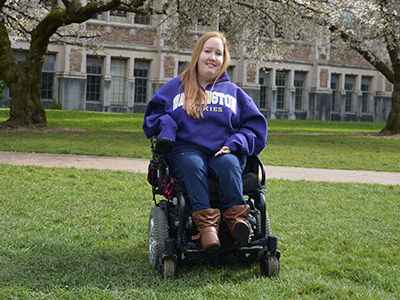Kayla

Research & Advocacy
When I was in high school, I felt lost and unsure of where I was headed in terms of college and my future career. I felt as if I was waging a constant battle against my label as a student with a disability. Not being encouraged to take Advanced Placement classes, participate in the Running Start program, or even knowing other students with disabilities who were college- bound really had an effect on my confidence level. During my junior year, a supportive special education teacher exposed me to life-changing resources that helped me get into college and get ready for transition out of high school. Without her, I don’t know where I would be.
Being a first generation college student, I had very little support in the transition process, especially with the added difficulties associated with being a student with a disability. This teacher told me about the DO-IT Scholars program, a transition to college program at the University of Washington for students with disabilities. From that point on, I became a different person. Building a support network of other people with disabilities and mentors who could help me find job opportunities made all the difference for me. After all, your support network is made up of your biggest fans—those who will cheer you on and remind you that you are capable of succeeding.
After conquering the transition to college, my next challenge was finding the right career path. Because I struggled in math and science classes in high school, I never considered that I would take a path toward related fields. Fortunately, my college experience allowed me to take classes from all disciplines, and I discovered my love of research. I was able to channel my passion for social change by designing tangible ways of creating that change. I studied community psychology, a field that draws from multiple perspectives in order to examine the wellness of entire groups of people.
I am pursuing a master’s degree that bridges what I learned in my undergraduate program to a potential career. I would like to focus on research and program development to make positive change within the systems put in place for people with disabilities. I envision a world where the disparity in employment between people with disabilities and people who are not is reduced and more opportunities for minorities are put in place. I know how influential these opportunities can be.